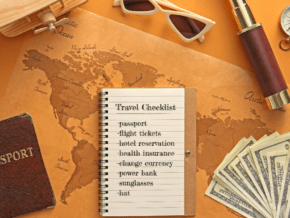Unless your parents were immigrants, you may be among the many people who grew up speaking only one language. Since you’re reading this article, we’d guess that language is English. Yet the world is filled with thousands of languages which, for many people, can be intimidating.
As frequent travelers, we can relate to the travel language barrier issue. Speaking from experience, few things are as challenging as not being able to check in at your hotel because no one at reception speaks English. Worse yet if you have dietary limitations, as we do. How can you read the menu? How do you ask the waiter if a dish contains shellfish?
Learning a foreign language makes little sense when you’re only visiting for a week or two. So how do you communicate when you don’t know the language?
1. You don’t have to be multilingual to travel.

Speaking from personal experience, if you visit popular destinations like Western Europe, the Caribbean, and cruise ports worldwide, you won’t have any language problems when traveling. English is so widespread now that almost anywhere where there are Western tourists, there are people who speak some English.
You may also be surprised to learn that many foreign countries, such as Singapore and Malaysia, use English as their main language.
Even with the joys of independent exploration, venturing off the beaten path often means encountering language barriers. In such situations, seeking help isn’t a sign of weakness, but rather a key to unlocking deeper connections. We had an amazing Kurdish guide in Iraq, who helped us accept an invite to share tea with a Yezidi family. Hiring a Portuguese translator could open similar doors in the Amazon.
And yet, people who don’t speak a lick of the local tongue still travel there and come back safely, with wonderful stories to tell!
2. A little foreign language goes a long way
If you’re a frequent traveler, you’ve probably already discovered that learning new languages opens doors.
Even if you didn’t learn French or Spanish in school, you probably know what merci and si mean. Almost everyone can learn a few phrases or, at the very least, a few words to help them get by when traveling.
After all, we are guests in their country. The least we can do is to try to learn some of the language as well as the country’s etiquette. This not only shows locals that you are trying your best, but they may also be more willing to help you out. Even better, you may even make a friend or two along the way!
lso, before you go, make sure you know the language spoken there. For example, in Egypt, you might need to know Arabic, but in Brazil, you might want to look into hiring a Portuguese translator.
3. Learn basic foreign language phrases before traveling
The chances of you visiting a country where absolutely nobody speaks English are very slim, but it is always fun to try new things. So, learn a few phrases in a new language just for fun. You know what? You may even find that you actually do have a talent for languages after all!
Generally speaking, the most important phrases are:
- Please
- Thank you
- Hello
- How much?
- Sorry (or excuse me)
- Yes
- No
One of the best tricks we’ve heard is to ask your hotel for a business card and carry it with you. It will come in handy if you get lost. It will also help bus drivers and taxi drivers know where you want to go.
Another good idea is to learn how to pronounce the names of the places you want to travel to. If you are worried that you will forget the words or phrases, make a note in a notebook or on your phone for quick reference.
ⓘ TIP: Buy travel guide, like the ones produced by Lonely Planet. They have lists of basic foreign phrases, as well as maps and travel information.

4. Relax and just do your best
Relax. The first thing to remember is not to be too shy or embarrassed about your feeble attempts. People are incredibly forgiving and appreciate anyone trying to speak a few words of their language. Remember that the locals probably have to try speaking English and it is just as tricky and embarrassing for them too.
All travelers and locals can ask of one another is that they try.

5. Don’t take yourself too seriously
Most of all, you need to hold onto your sense of humor. Chances are that you will make some mistakes or sound a little silly.
Sometimes the locals will laugh at your attempts. Don’t take it personally. In some cultures, laughter is used to help someone avoid embarrassment or “losing face.” The proper response is to laugh along with them.
It’s also okay to ask them to correct you. The goal is to learn from your mistake.

6. Remember to be polite
How often have you been traveling and heard someone say, “Doesn’t anybody speak English around here?” As a tourist, you are a guest in their country, so it is very important to remain polite and pleasant. It would be totally obnoxious and ignorant to expect absolutely everyone to speak your language.

7. Be patient
When trying to communicate with someone who does not speak English or does not speak it well, it is easy to get frustrated, but this is not their fault. Be patient.
If they are struggling with their English, politely try and help them. Most will appreciate the opportunity to improve their English.

8. Learn a little about the culture
Research the culture and the local etiquette. By finding out how to correctly greet someone or how to convey respect, you may find that locals are more obliged to communicate with you. Since many cultures view seemingly harmless Western hand gestures as disrespectful or insulting, it is also crucial to learn which ones to avoid.
Perhaps there is more than one language, in which case it would be good to find out what regions speak what language. For example, some regions in China are predominantly Mandarin-speaking while others are predominantly Cantonese-speaking.

9. Pick up on local mannerisms
Once you arrive at your destination, take time to listen to the words people use in day-to-day conversations. Often language learned off the internet or from a book is very formal and it may be useful to learn the more conversational phrases. Consider, for example, the contexts in which we use ‘Thank you very much’ and just ‘Thanks’.

10. Be brief
Chances are that you will find someone who speaks some broken English and you will be able to ask them for help or information. When talking to someone who is not a native English speaker, it is essential to keep your sentences short and concise.
Use simple language and avoid slang as this can cause confusion. Choose your words carefully and be mindful of what words are more commonly used internationally. For instance, “toilet” may not be the most delicate or eloquent word, but your one-word question is clear. It’s also much easier to understand than “do you have a bathroom” or “where is the restroom.”

11. Speak normally
Try to avoid speaking too loudly. This may seem like the logical way to get your message across, but it can come across as aggressive.
Another mistake many travelers make is to speak too slowly. There is a fine line between talking clearly and at a pace that allows the listener to process the words. Besides, speaking too slowly can sound condescending.

12. Use non-verbal cues
If all else fails, mime it out! Using hand gestures can often help get the message through. You can also use your face to convey a message. For example, if someone is trying to help you but they are speaking too fast or you do not understand them, look confused and quizzical so they know to slow down and try again.
This works both ways, too. You may not understand how to get to the toilet, but when he points you’ll quickly figure out where to go.
Keep a pen and a notebook in your backpack. It can be useful to have around when asking for directions as some locals may draw out a rough map for you. These are extremely useful and make lovely mementos.

13. Use technology
Thankfully, we also have technology on our side! It is the 21st century after all, and with that comes a myriad of apps and technology that can help you communicate when you travel. These days there are loads of apps and sites that can help us translate along the way.
The number one app to get, for both Android and iOS users, is Google Translate. Not only can you type in a phrase, translate it and then get the app to speak the translated phrase for you, but you can also decipher signposts and other writing you may not understand.
Your phone is definitely your best friend when traveling to a non-English speaking country.
- Download maps for both your and your taxi drivers’ use.
- Take pictures of your hotel or your street so that you can show someone when asking for directions.
- You can also pre-download pictures of the attractions you would like to visit for the very same purpose.
ⓘ TIP: If you would like to learn some phrases before traveling, try out Duolingo. This free app allows you to learn phrases in many languages.
Inspired? Pin this post and share it with your friends!






Great tips! It can be a really daunting and scary task to try and learn a new language abroad.
However I have found that typically at the 3 month mark I begin to improve substantially. I wrote a post similar to this, and one thing I talk about is watching foreign movies and tv shows. That greatly helped me learn Spanish when I was living in Costa Rica.
For those who have the luxury of 3 months in a country, you’re right about the movies and TV shows. No matter how much time you spend in a country, the biggest key is to not be afraid to try.